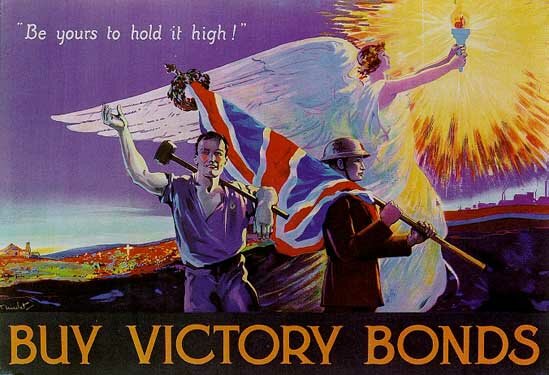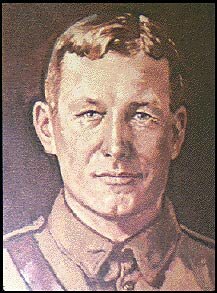
![]() The Canadian War Department used McCrae's poem in 1918 to get warloans
The Canadian War Department used McCrae's poem in 1918 to get warloans
(painting by Frank Lucien Nicolet)
 All over the world poets have written replies to McCrae's In Flanders Fields. The quality of these poems usually is not very good. They are so loaded with pathos that nowadays they sound pathetic. But in the days when they were made, during or shortly after the Great War, they certainly served a purpose.
All over the world poets have written replies to McCrae's In Flanders Fields. The quality of these poems usually is not very good. They are so loaded with pathos that nowadays they sound pathetic. But in the days when they were made, during or shortly after the Great War, they certainly served a purpose.
Even contemporary poets feel inspired to write an answer to John McCrae. And painters make his portrait, like the one on the right, painted by Evan Macdonald (1905-1972).
The best known reply-poem is We shall keep the faith, by Moina Michael.
Moina Michael was the American woman who also took the initiative to make the poppy the symbol of remembrance. This happened on 9th November 1918, two days before the Armistice. On a meeting with war-secretaries of the YMCA (Young Men's Christian Organisation) she decided to buy 25 poppies to be used at the upcoming remembrance.
Here follows her poem :
We shall keep the faith
Oh! You who sleep in Flanders' Fields
Sleep sweet - to rise anew;
We caught the torch you threw,
And holding high we kept
The faith with those who died.We cherish, too, the Poppy red
That grows on fields where valor led.
It seems to signal to the skies
That blood of heroes never dies.
But lends a lustre to the red
On the flower that blooms above the dead
In Flanders' fields.And now the torch and Poppy red
Wear in honour of our dead.
Fear not that ye have died for naught:
We've learned the lesson that ye taught
In Flanders' fields.
![]()
The poem fitted well in the usual American celebrations of heroism and victory. The same remark goes for America's Answer, a reply-poem made by R.W. Lillard (note that some of Lillard's lines are identical with lines in the poem by Moina Michael) :
America's Answer
Rest ye in peace, ye Flanders dead
The fight that you so bravely led
We've taken up. And we will keep
True faith with you who lie asleep,
With each a cross to mark his bed,
And poppies blowing overhed,
When once his own life-blood ran red
So let your rest be sweet and deep
In Flanders Fields.Fear not that ye have died for naught;
The torch ye threw to us we caught,
Ten million hands will hold it high,
And freedom's light shall never die!
We've learned the lesson that ye taught
In Flanders' fields.
![]()
And here is a third one, by C.B. Galbreath, who was the State Librarian of Ohio, in the USA, and a poet too :
In Flanders Fields
(An Answer)
In Flanders Field the cannon boom,
And fitful flashes light the gloom,
While up above; like eagles, fly
The fierce destroyers in the sky;
With stains, the earth wherein you lie,
Is redder than the poppy bloom,
In Flanders Field.Sleep on, ye brave, the shrieking shell,
The quaking trench, the startled yell,
The fury of the battle hell,
Shall wake you not, for all is well.
Sleep peacefully, for all is well.
Your flaming torch aloft we bear,
With burning heart, an oath we swear
To keep the faith, to fight it through,
To crush the foe, or sleep with you,
In Flanders Field.
![]()
In 1919, when people were still optimistic about the new future of the world, the Canadian poet Edna Jaques wrote 'In Flanders Now'.
In Flanders Now
We have kept faith, ye Flanders' dead,
Sleep well beneath those poppies red,
That mark your place.
The torch your dying hands did throw,
We've held it high before the foe,
And answered bitter blow for blow,
In Flanders' fields.And where your heroes' blood was spilled,
The guns are now forever stilled,
And silent grown.
There is no moaning of the slain,
There is no cry of tortured pain,
And blood will never flow again
In Flanders' fields.Forever holy in our sight,
Shall be those crosses gleaming white,
That guard your sleep.
Rest you in peace, the task is done,
The fight you left us we have won.
And 'Peace on Earth' has just begun,
In Flanders now.
![]()
There was also a song written, called Wonderful poppies of Flanders. I do not know who wrote it (if anyone has a clue please mail me - Rob Ruggenberg). Also I do not know whether the words are right, as they stem from the memory of a 86 years old veteran :
Wonderful poppies of Flanders
There's a land across the ocean
where the scarlet poppies grow
and the bird's sweet song is saddened,
as if they really know.
There's a place where countless heroes
for their country nobly died
though I'm sad and lonely now
I often think with pride :(Chorus:)
Wonderful poppies of Flanders
Flowers of brilliant hue.
Flowers that the angels
have washed with their tears.
They bring me comfort,
through long, lonely years.I've read a story of love divine
in your petals of brilliant red.
God, in his goodness, has sent you to mark
the graves of our glorious dead.(Repeat Chorus)
There is love, devotion, honour
in each little scarlet flower.
I'd kiss each one so fondly
If I had but the power.
May the angels always tend you
is my constant hope and prayer.
For I know that God remembers
all the heroes sleeping there.(Repeat Chorus)
![]()
Last but not least one of the most recent versions of a reply poem: the rocksong In Flanders Fields, recorded in 2004 by the Russian band Romislokus, from Moscow. The lyrics are by Stan Hilborn, host of the Canadian progressive rock radioshow "Adventures In Plastic Land". He is befriended to the members of the Russian band and he wrote the song especially for them.
Click on the arrow if you want hear that song. Click here to download it (MP3 PRO file, 1,8 Mb).
In Flanders Fields
starting with the text of the original poem, followed by
In Flanders fields the poppies grow,
We've left our soldiers, row by row
Far and away, on distant lands
Where they fought bravely
And made their stands.For king, country and the cross,
Paid with lives, but what of the cost.
We cannot erase what we have done
War... there are only losers, winners none.If we could all but learn from the past,
Then surely THAT war would have been the last.
Speaking for the ones that had to go,
Though poppies grow
In Flanders fields.
(The third stanza of this reply-poem was not included in the song)
 Click here to read McCrae's original poem.
Click here to read McCrae's original poem.
Bronnen voor dit artikel -/- Sources for this article.
Click here to return to the frontpage of 'The Heritage of the Great War'.